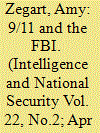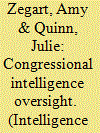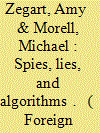| Srl | Item |
| 1 |
ID:
079217


|
|
|
|
|
| Publication |
2007.
|
| Summary/Abstract |
Public discussion about the 11 September 2001 terrorist attacks has focused on the human causes of tragedy - on individual mistakes, failures of leadership, and the power plays between intelligence officers in the field and policymakers in Washington. But closer examination of the FBI suggests that organizational weaknesses are the root cause of poor agency performance. Longstanding deficiencies in the FBI's organizational structure, culture, and incentive systems proved crippling in the 1990s, when the Cold War ended and the terrorist threat emerged. These lingering weaknesses ultimately prevented the bureau from capitalizing on 12 separate opportunities that might have disrupted the 9/11 plot
|
|
|
|
|
|
|
|
|
|
|
|
|
|
|
|
| 2 |
ID:
173811


|
|
|
|
|
| Summary/Abstract |
Drones are considered poor coercion tools: They cannot operate in contested airspace and they offer low-cost fights instead of more credible, costly signals. However, this article finds that technological advances will soon enable drones to function in hostile environments. Moreover, drones offer three unique coercion advantages that theorists did not foresee: sustainability in long duration conflicts, certainty of precision punishment which can change the psychology of adversaries, and changes in the relative costs of war. A unique survey of 259 foreign military officers finds that costly signals are less credible than assumed and that drones demonstrate resolve in new ways.
|
|
|
|
|
|
|
|
|
|
|
|
|
|
|
|
| 3 |
ID:
100931


|
|
|
|
|
| Publication |
2010.
|
| Summary/Abstract |
This article seeks to reconcile congressional oversight models in theory with oversight realities in intelligence. For nearly three decades, political scientists have argued that Congress controls the bureaucracy - and in surprisingly efficient ways. Yet the history of intelligence oversight suggests the opposite. We take a fresh look at the logic and empirics of police patrol and fire alarm models and find that neither explains intelligence oversight well. Both rely on assumptions, such as the presence of strong and plentiful interest groups, which characterize domestic policy but not US intelligence policy. Our data - comparing committee hearing activities, legislative productivity, and interest groups across different policy domains between 1985 and 2005 - reveal that oversight varies dramatically by policy issue, and that intelligence almost always ranks at the bottom. Ironically, the same electoral incentives that generate robust oversight in some policy areas turn out to be far weaker in intelligence.
|
|
|
|
|
|
|
|
|
|
|
|
|
|
|
|
| 4 |
ID:
166159


|
|
|